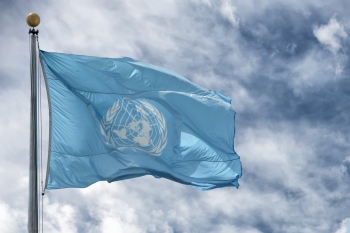The event "Urban Warfare and Displacement", held May 27, 2022, during PoC Wek 2022, was organized with the aim of raising public awareness on the issue of protecting civilians in conflict zones, with particular reference to urban warfare and the consequences on the civilian population of explosive weapons, one of the main causes of displacement.
The webinar was hosted by Grainne O’Hara, director of the Division of International Protection of the United Nations High Commissioner for Refugees (UNHCR) and introduced by the Deputy Director of the Permanent Mission of the Republic of Ireland to the UN, Cáit Moran.
The first speaker was Muhanad Abdulsalam, who talked about his personal experience as an internally displaced person (IDP). Now lawyer and civil society activist, Abdulsalam was involved in the clashes between ISIS and Iraqi government forces in the battle of Mosul in late 2016, being mutilated by a mine.
According to him, his testimony, particularly dramatic and representative of the harsh reality of war, must serve as a warning to the international community on the devastating effects of explosive weapons on civilians in conflict zones. The fact that many of these devices are prohibited by international conventions has not been enough to establish an effective mechanism to prevent their use in urban areas, subjecting the civilian population to endless sufferings and very difficult prospects of returning to their homes and their daily lives.
Among the speakers were Cecilia Jimenez-Damary, Special Rapporteur for the human rights of internally displaced persons, and Cecile Aptel, UNIDIR deputy director. Both presented and discussed recent data that show the harsh reality of the current situation for internally displaced persons: in 2021, 14.4 million new movements were registered, an increase of 50% compared to the previous year. Furthermore, the nature of the conflicts in which these people are involved has become significantly more asymmetrical and fragmented, with the participation of more non-state and paramilitary actors. The dynamics of modern warfare see their hotspots in densely populated urban areas. Dr. Aptel also dedicated a large part of her speech to explaining the indirect and reverberating effects of explosive weapons: medium-long term health risks, unavailability of civil infrastructures such as schools and hospitals, interruption of essential services, deterioration of hygienic conditions and so on. Clearly, the most vulnerable categories of people, such as women, children, the elderly, and people with disabilities, are much more exposed to these indirect damages, some of which are recorded almost exclusively for some single categories among those mentioned, such as the exacerbation of acts of gender-based violence against women. In addition to those already mentioned, among the long-term consequences of the use of explosive weapons there are considerable environmental damages, for which there are still no effective and lasting remedies.
Another relevant speech was that of Ilene Cohn, director of the UN Mine Action Service (UNMAS), who presented the issues related to the contamination of mines in conflict areas, the main cause of death and injury for displaced people fleeing or seeking to return to their places of origin. These interventions show a convergence of ideas as regards the actions to be undertaken. The most immediate and short-term are based on a preventive approach that includes local realities as much as possible in their relations with NGOs, political actors and the UN multilateral system.
Furthermore, it is necessary for the parties involved to genuinely begin to ensure easier access for humanitarian aid and to implement their obligations under international humanitarian law and the laws of war. On the longer term, the most desirable goal is a total ban of explosive weapons in urban areas, even though non-state parties are difficult to regulate, and certain state parties have shown not to be committed enough to enforce the existing prevention mechanisms.
Some of these last points were addressed in the last speech of the conference, delivered by Marc Garlasco, military advisor at the NGO PAX for Peace. These emphasize the crucial role that the armed forces themselves play in preventing indiscriminate attacks and in ensuring safe routes and best practices in order to safeguard the safety and security of civilians.




